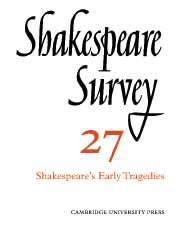Book contents
- Frontmatter
- Shakespeare’s Earliest Tragedies: ‘Titus Andronicus’ and ‘Romeo and Juliet’
- The Aesthetics of Mutilation in ‘Titus Andronicus’
- The Motif of Psychic Division in ‘Richard III’
- The Antic Disposition of Richard II
- The Prince of Denmark and Claudius’s Court
- ‘Hamlet’ and the ‘Moriae Encomium’
- The Relation of Henry V to Tamburlaine
- Shakespeare and the Puritan Dynamic
- Equity, ‘The Merchant of Venice’ and William Lambarde
- ‘Love’s Labour’s Won’ and the Occasion of ‘Much Ado’
- The Date and Production of ‘Timon’ Reconsidered
- Shakespeare, Her Majesty’s Players and Pembroke’s Men
- Judi dench talks to Gareth Lloyd Evans
- Shakespeare Straight and Crooked: A Review of the 1973 Season at Stratford
- The Year's Contributions to Shakespearian Study 1 Critical Studies
- 2 Shakespeare’s Life, Times, and Stage
- 3 Textual Studies
- Index
- Plate section
3 - Textual Studies
Published online by Cambridge University Press: 28 March 2007
- Frontmatter
- Shakespeare’s Earliest Tragedies: ‘Titus Andronicus’ and ‘Romeo and Juliet’
- The Aesthetics of Mutilation in ‘Titus Andronicus’
- The Motif of Psychic Division in ‘Richard III’
- The Antic Disposition of Richard II
- The Prince of Denmark and Claudius’s Court
- ‘Hamlet’ and the ‘Moriae Encomium’
- The Relation of Henry V to Tamburlaine
- Shakespeare and the Puritan Dynamic
- Equity, ‘The Merchant of Venice’ and William Lambarde
- ‘Love’s Labour’s Won’ and the Occasion of ‘Much Ado’
- The Date and Production of ‘Timon’ Reconsidered
- Shakespeare, Her Majesty’s Players and Pembroke’s Men
- Judi dench talks to Gareth Lloyd Evans
- Shakespeare Straight and Crooked: A Review of the 1973 Season at Stratford
- The Year's Contributions to Shakespearian Study 1 Critical Studies
- 2 Shakespeare’s Life, Times, and Stage
- 3 Textual Studies
- Index
- Plate section
Summary
The survey of this year’s work in Shakespearian textual studies may well take as its point of departure the papers delivered by Charlton Hinman and Fredson Bowers to the World Shakespeare Congress at Vancouver in September 1971, both of which take stock of the situation then current and concern themselves with the immediate prospect as well as with the vital needs of future editors of Shakespeare. Hinman recapitulates the major developments from 1964 to 1971, coming to rest on D. F. McKenzie’s ‘Printers of the Mind’ and assessing the damage sustained by the structure of bibliographical analysis of the early texts as the dust and smoke clear after that most severe assault on many of the assumptions underlying such analysis. He finds those parts of the structure most haunted by Shakespearians among the least shaken, namely, the identification of compositors on internal evidence and the establishment of their characteristics, the demonstration of setting by formes in the printing of the First Folio and the currency in the Elizabethan period of methods of proof-correction less rigorous than those described by Moxon in the 1680s. Points that he is willing to concede include the normality of concurrent printing in the Elizabethan period as well as later and the consequent invalidity of analyses, on internal evidence alone, of the interrelation of rates of composition and rates of presswork.
- Type
- Chapter
- Information
- Shakespeare Survey , pp. 179 - 192Publisher: Cambridge University PressPrint publication year: 1974



